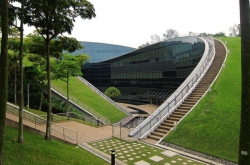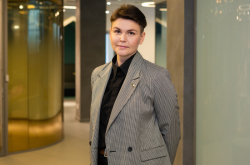Ekaterina Zugairova is a junior student at the Industrial Ecology Department. As a future ecological engineer, she’s always paid great attention to her professional development. Apart from getting the practical experience during the internships, she is also eager to participate in different educational conferences for students.
This summer, Ekaterina participated in the «Russia Youth Environmental Program». This four-week internship, which took place in the USA, was dedicated to important environmental issues such as sustainability, recycling and ecological leadership. «My English language teacher Inna Anokhina told me of this project and convinced me to try. The application form included general questions connected with our educational background, hobbies, achievements and so forth, and some specific ones which had to do with ecological issues. We had to explain why we believe that eco problems are important and how do we understand this discipline.»

Ekaterina was surprised that not only ecologists gathered for this program — the organizers invited journalists, managers, economists and even programmers. Despite different backgrounds, each found something interesting and useful for them. Some students decided to connect their further careers with ecology. It may seem that only biologists and ecologists are the ones who solve environmental problems. However, finding right and effective solutions is impossible without the joint efforts of specialists in ecology, economics, politics and culture. This approach is one of the core principles of sustainable development.
The students spent most of the time in Vermont, one of the «greenest» states of America. They attended classes at local colleges and universities, as well as took part in volunteering. The students picked vegetables for families in need.
Ekaterina appreciated the way the lecturers and speakers interacted with students First of all, they presented information in simple words so as to overcome the language barrier. Furthermore, they constantly asked different questions to the students for discussion. They never had «typical» lectures when the only things students do are listening to a professor and writing it all down. Moreover, among the speakers there were students who shared their experience.

Ekaterina also thinks about the problem of unpopularity of her profession. «My parents and friends knew nothing about ecological engineering. I was often asked about where I plan to work and what exactly am I going to do after graduation,» said the student. During the internship, she got acquainted with the discipline «ecological leadership», which focuses on effective ways of ecological responsibility promotion, gathering teams for conducting projects, presentation and communication skills. According to Ekaterina, what they’ve learned was how to inspire people to make a change.
The course made the student think about ecology in terms of social significance. Now she develops an educational project for freshmen who chose ecological engineering as their future profession.
«I want them to know what opportunities they have even when they are still first-year students. I want them to apply this knowledge to real projects. Unfortunately, during the last three years nobody told me that I already could contribute. Today, it is me who can guide the beginners.»



